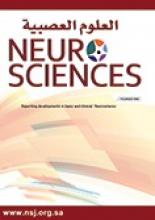Abstract
OBJECTIVE: To determine the relation between maternal Helicobacter pylori (H. pylori) infection and the occurrence of neural tube defects (NTDs) in newborns.
METHODS: This hospital-based case-control study was carried out in Dezyani Teaching Hospital, Gorgan, Northern Iran from April 2007 to March 2009. Thirty-five mothers with NTD-affected newborns, and 53 mothers with healthy newborns were considered the cases and controls. A peripheral blood sample was obtained from all subjects, and H. pylori infections were tested by H. pylori serum antibody. The serum folic acid, vitamin B12, ferritin, and homocysteine concentrations were measured by laboratory tests. Data were analyzed using odds ratio (OR) and logistic regression.
RESULTS: Forty-three percent of cases, and 26% of controls were positive for H. pylori IgG antibody, and this difference was not significant. The H. pylori seropositivity non significantly increased the risk of NTD-affected pregnancies (OR: 2.08; 95% confidence interval [CI]: 0.84-5.17, p=0.11). Serum vitamin B12 deficiency was detected in 17% of cases and 13% of controls, and folic acid deficiency in 17% of cases and 13% of controls (p=0.61). The H. pylori seropositivity was non significantly associated with low serum folate (OR 1.93 CI: 0.58-6.4, p=0.34) and ferritin (OR 1.24; CI: 0.42-3.60, p=0.68).
CONCLUSION: Maternal H. pylori infection can increase the risk of occurrence of NTDs in newborns.
- Copyright: © Neurosciences
Neurosciences is an Open Access journal and articles published are distributed under the terms of the Creative Commons Attribution-NonCommercial License (CC BY-NC). Readers may copy, distribute, and display the work for non-commercial purposes with the proper citation of the original work.






